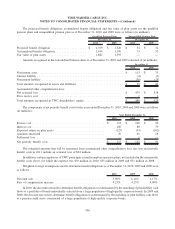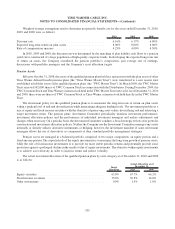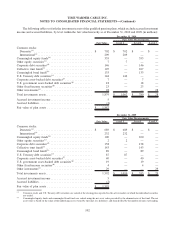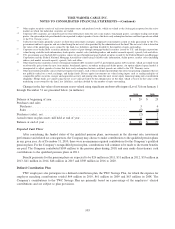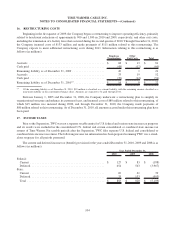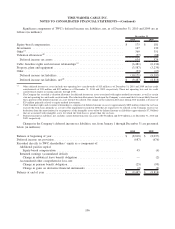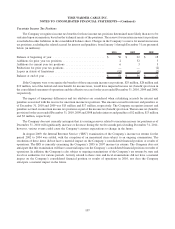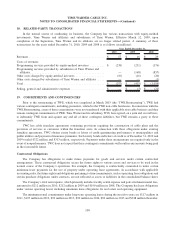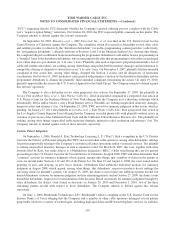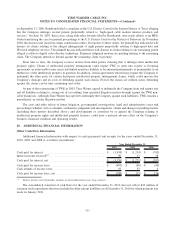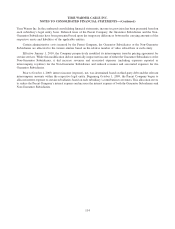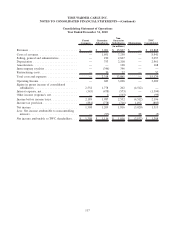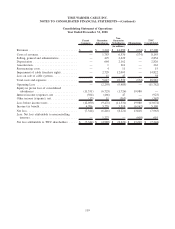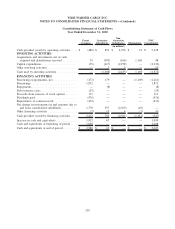Time Warner Cable 2010 Annual Report Download - page 122
Download and view the complete annual report
Please find page 122 of the 2010 Time Warner Cable annual report below. You can navigate through the pages in the report by either clicking on the pages listed below, or by using the keyword search tool below to find specific information within the annual report.“FCC”) requesting that the FCC determine whether the Company’s general ordering process complies with the Cable
Act’s “negative option billing” restriction. On October 20, 2010, the FCC requested public comment on this matter. The
Company intends to defend against this lawsuit vigorously.
On September 20, 2007, Brantley, et al. v. NBC Universal, Inc., et al. was filed in the U.S. District Court for the
Central District of California against the Company. The complaint, which also named as defendants several other cable
and satellite providers (collectively, the “distributor defendants”) as well as programming content providers (collectively,
the “programmer defendants”), alleged violations of Sections 1 and 2 of the Sherman Antitrust Act. Among other things,
the complaint alleged coordination between and among the programmer defendants to sell and/or license programming on
a “bundled” basis to the distributor defendants, who in turn purportedly offer that programming to subscribers in packaged
tiers, rather than on a per channel (or “à la carte”) basis. Plaintiffs, who seek to represent a purported nationwide class of
cable and satellite subscribers, are seeking, among other things, unspecified treble monetary damages and an injunction to
compel the offering of channels to subscribers on an “à la carte” basis. On December 3, 2007, plaintiffs filed an amended
complaint in this action that, among other things, dropped the Section 2 claims and all allegations of horizontal
coordination. On October 15, 2009, the district court granted with prejudice a motion by the distributor defendants and the
programmer defendants to dismiss the plaintiffs’ third amended complaint, terminating the action. On April 19, 2010,
plaintiffs appealed this decision to the U.S. Court of Appeals for the Ninth Circuit. The Company intends to defend against
this lawsuit vigorously.
The Company is also a defendant in two other purported class actions. On September 17, 2009, the plaintiffs in
Jessica Fink and Brett Noia, et al. v. Time Warner Cable Inc., filed an amended complaint in a purported class action in
U.S. District Court for the Southern District of New York alleging that the Company uses a throttling technique which
intentionally delays and/or blocks a user’s Road Runner service. Plaintiffs are seeking unspecified monetary damages,
injunctive relief and attorneys’ fees. On September 25, 2009, TWC moved for summary judgment in this action, which is
pending. On January 27, 2011, the plaintiffs in Calzada, et al. v. Time Warner Cable LLC, filed a purported class action in
the Los Angeles County Superior Court alleging that the Company recorded phone calls with plaintiffs without notice in
violation of provisions of the California Penal Code and the California Unfair Business Practices Act. The plaintiffs are
seeking, among other things, unspecified treble monetary damages, injunctive relief, restitution and attorneys’ fees. The
Company intends to defend against each of these lawsuits vigorously.
Certain Patent Litigation
On September 1, 2006, Ronald A. Katz Technology Licensing, L.P. (“Katz”) filed a complaint in the U.S. District
Court for the District of Delaware alleging that TWC and several other cable operators, among other defendants, infringe
18 patents purportedly relating to the Company’s customer call center operations and/or voicemail services. The plaintiff
is seeking unspecified monetary damages as well as injunctive relief. On March 20, 2007, this case, together with other
lawsuits filed by Katz, was made subject to a Multidistrict Litigation (“MDL”) Order transferring the case for pretrial
proceedings to the U.S. District Court for the Central District of California. In April 2008, TWC and other defendants filed
“common” motions for summary judgment, which argued, among other things, that a number of claims in the patents at
issue are invalid under Sections 112 and 103 of the Patent Act. On June 19 and August 4, 2008, the court issued orders
granting, in part, and denying, in part, those motions. Defendants filed additional individual motions for summary
judgment in August 2008, which argued, among other things, that defendants’ respective products do not infringe the
surviving claims in plaintiff’s patents. On August 13, 2009, the district court found one additional patent invalid, but
denied defendants’ motions for summary judgment on three remaining patents, and on October 27, 2009, the district court
denied the defendants’ requests for reconsideration of the decision. Based on motions for summary judgment brought by
other defendants, the district court found, in decisions on January 29, 2010 and December 3, 2010, two of the three
remaining patents invalid with respect to those defendants. The Company intends to defend against this lawsuit
vigorously.
On June 1, 2006, Rembrandt Technologies, LP (“Rembrandt”) filed a complaint in the U.S. District Court for the
Eastern District of Texas alleging that the Company and a number of other cable operators infringed several patents
purportedly related to a variety of technologies, including high-speed data and IP-based telephony services. In addition,
110
TIME WARNER CABLE INC.
NOTES TO CONSOLIDATED FINANCIAL STATEMENTS—(Continued)


